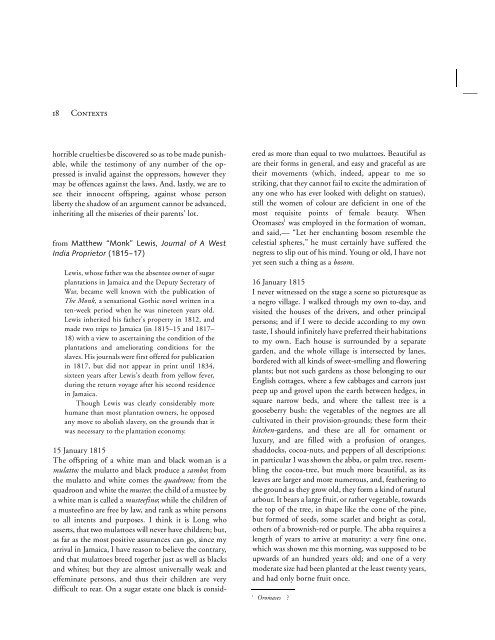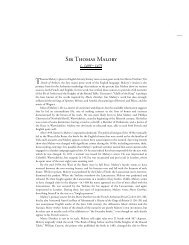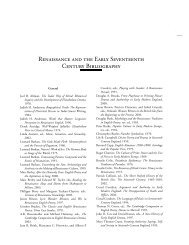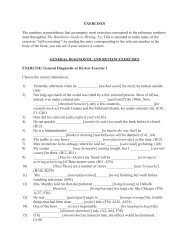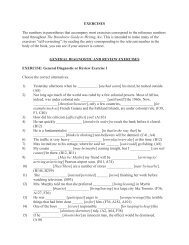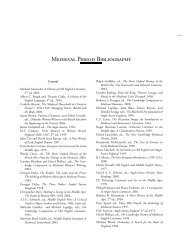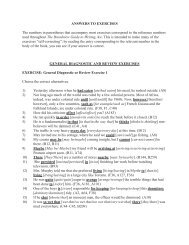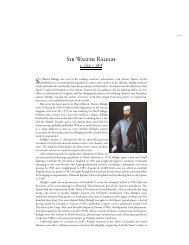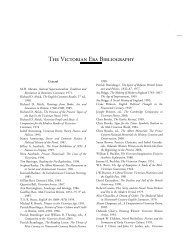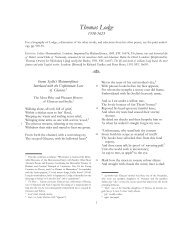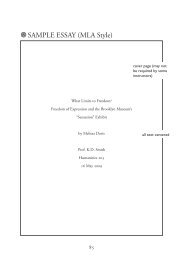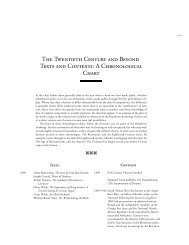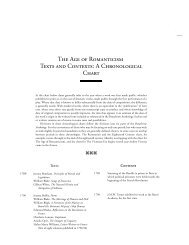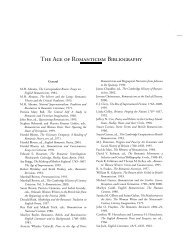Contexts: The Abolition of Slavery - Broadview Press Publisher's Blog
Contexts: The Abolition of Slavery - Broadview Press Publisher's Blog
Contexts: The Abolition of Slavery - Broadview Press Publisher's Blog
You also want an ePaper? Increase the reach of your titles
YUMPU automatically turns print PDFs into web optimized ePapers that Google loves.
18 <strong>Contexts</strong><br />
horrible cruelties be discovered so as to be made punishable,<br />
while the testimony <strong>of</strong> any number <strong>of</strong> the oppressed<br />
is invalid against the oppressors, however they<br />
may be <strong>of</strong>fences against the laws. And, lastly, we are to<br />
see their innocent <strong>of</strong>fspring, against whose person<br />
liberty the shadow <strong>of</strong> an argument cannot be advanced,<br />
inheriting all the miseries <strong>of</strong> their parents’ lot.<br />
from Matthew “Monk” Lewis, Journal <strong>of</strong> A West<br />
India Proprietor (1815–17)<br />
Lewis, whose father was the absentee owner <strong>of</strong> sugar<br />
plantations in Jamaica and the Deputy Secretary <strong>of</strong><br />
War, became well known with the publication <strong>of</strong><br />
<strong>The</strong> Monk, a sensational Gothic novel written in a<br />
ten-week period when he was nineteen years old.<br />
Lewis inherited his father’s property in 1812, and<br />
made two trips to Jamaica (in 1815–15 and 1817–<br />
18) with a view to ascertaining the condition <strong>of</strong> the<br />
plantations and ameliorating conditions for the<br />
slaves. His journals were first <strong>of</strong>fered for publication<br />
in 1817, but did not appear in print until 1834,<br />
sixteen years after Lewis’s death from yellow fever,<br />
during the return voyage after his second residence<br />
in Jamaica.<br />
Though Lewis was clearly considerably more<br />
humane than most plantation owners, he opposed<br />
any move to abolish slavery, on the grounds that it<br />
was necessary to the plantation economy.<br />
15 January 1815<br />
<strong>The</strong> <strong>of</strong>fspring <strong>of</strong> a white man and black woman is a<br />
mulatto; the mulatto and black produce a sambo; from<br />
the mulatto and white comes the quadroon; from the<br />
quadroon and white the mustee; the child <strong>of</strong> a mustee by<br />
a white man is called a musteefino; while the children <strong>of</strong><br />
a musteefino are free by law, and rank as white persons<br />
to all intents and purposes. I think it is Long who<br />
asserts, that two mulattoes will never have children; but,<br />
as far as the most positive assurances can go, since my<br />
arrival in Jamaica, I have reason to believe the contrary,<br />
and that mulattoes breed together just as well as blacks<br />
and whites; but they are almost universally weak and<br />
effeminate persons, and thus their children are very<br />
difficult to rear. On a sugar estate one black is consid-<br />
ered as more than equal to two mulattoes. Beautiful as<br />
are their forms in general, and easy and graceful as are<br />
their movements (which, indeed, appear to me so<br />
striking, that they cannot fail to excite the admiration <strong>of</strong><br />
any one who has ever looked with delight on statues),<br />
still the women <strong>of</strong> colour are deficient in one <strong>of</strong> the<br />
most requisite points <strong>of</strong> female beauty. When<br />
Oromases 1 was employed in the formation <strong>of</strong> woman,<br />
and said,— “Let her enchanting bosom resemble the<br />
celestial spheres,” he must certainly have suffered the<br />
negress to slip out <strong>of</strong> his mind. Young or old, I have not<br />
yet seen such a thing as a bosom.<br />
16 January 1815<br />
I never witnessed on the stage a scene so picturesque as<br />
a negro village. I walked through my own to-day, and<br />
visited the houses <strong>of</strong> the drivers, and other principal<br />
persons; and if I were to decide according to my own<br />
taste, I should infinitely have preferred their habitations<br />
to my own. Each house is surrounded by a separate<br />
garden, and the whole village is intersected by lanes,<br />
bordered with all kinds <strong>of</strong> sweet-smelling and flowering<br />
plants; but not such gardens as those belonging to our<br />
English cottages, where a few cabbages and carrots just<br />
peep up and grovel upon the earth between hedges, in<br />
square narrow beds, and where the tallest tree is a<br />
gooseberry bush: the vegetables <strong>of</strong> the negroes are all<br />
cultivated in their provision-grounds; these form their<br />
kitchen-gardens, and these are all for ornament or<br />
luxury, and are filled with a pr<strong>of</strong>usion <strong>of</strong> oranges,<br />
shaddocks, cocoa-nuts, and peppers <strong>of</strong> all descriptions:<br />
in particular I was shown the abba, or palm tree, resembling<br />
the cocoa-tree, but much more beautiful, as its<br />
leaves are larger and more numerous, and, feathering to<br />
the ground as they grow old, they form a kind <strong>of</strong> natural<br />
arbour. It bears a large fruit, or rather vegetable, towards<br />
the top <strong>of</strong> the tree, in shape like the cone <strong>of</strong> the pine,<br />
but formed <strong>of</strong> seeds, some scarlet and bright as coral,<br />
others <strong>of</strong> a brownish-red or purple. <strong>The</strong> abba requires a<br />
length <strong>of</strong> years to arrive at maturity: a very fine one,<br />
which was shown me this morning, was supposed to be<br />
upwards <strong>of</strong> an hundred years old; and one <strong>of</strong> a very<br />
moderate size had been planted at the least twenty years,<br />
and had only borne fruit once.<br />
1 Oromases ?


